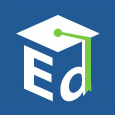Supporting Early Childhood
Rebecca Davis is an Education Program Specialist within the Office of Special Education Programs on the Early Childhood and Parent Program Team. Rebecca was an early childhood special education teacher and then went on to complete her PhD in Special Education from the University of Illinois Urbana-Champaign in 2021. Her research interests focus on investigating early childhood environments, training and coaching natural communication partners to use evidence-based practices, and supporting families of children with disabilities.
How did you begin your career in early childhood?
For as long as I can remember, I wanted to be a teacher. I can recall all the influential teachers from my childhood, and I aspired to be just like them. As I started my college journey, I began to grow uncertain of where exactly my passion lied within the field of education. That interest narrowed into the field of early childhood special education in my third year as an undergraduate student. I was taking an early childhood assessment course and an infants and young children’s course at Illinois State University. I felt as though I immediately found my home. While taking these courses, I completed practicum hours allowing me to observe early childhood environments. Watching our youngest learners explore the new world around them compelled me. From that moment on, I dedicated my time and effort towards becoming the best possible teacher I could. I was then able to follow my passion as I graduated and began teaching as an early childhood special education teacher. This has progressed to a Master’s and Doctoral Degree focused on impacting the lives of our youngest learners, their families, educators, and related service providers.
What efforts have you been involved in to improve the quality of early childhood programs and services?
Throughout my experiences as an early childhood educator, student, and researcher, I have been able to partake in a variety of opportunities that have enhanced my skills and expertise in the field. As an early childhood educator, I was a strong advocate for providing equitable access to inclusive opportunities for all children. When I began to establish my early research career, I had a heavy emphasis on families and educators and equipping them with the knowledge and expertise to also be fierce advocates. As an Office of Special Education Programs intern in summer 2019, I was able to engage in projects related to early childhood and parent information and resources. As a researcher, I have collaborated with strong leaders in the field that focus efforts on early childhood environments and the use of machine learning to positively impact the monitoring of young children’s developmental milestones. This mitigates the potential of late disability diagnosis while additionally providing families and service providers with strategies that can support the child’s growth and development. Additionally, I have served as a clinical instructor for pre-service educators pursuing early childhood and special education degrees. This has included ongoing mentorship, supervision, and long-term professional relationships that continue to impact young children beyond just a required course through a credentialing program.
What are some of the challenges you have experienced in your work and what strategies have you tried to overcome them?
Some of the biggest challenges I have experienced are ensuring equitable services for young children with and without disabilities, access to high-quality services, and preparing future personnel to be ready for all that may come their way. When I continued to observe barriers, I decided to advance my career in higher education to make a larger impact. I enrolled in an OSEP-funded doctoral program that led me to a world of understanding and continued passion for early childhood. As an educator, I am a strong advocate for young learners, and I strive to provide families, practitioners, and related service providers resources that can enhance the effectiveness of their environments and interactions.
What suggestions do you have for others interested in improving early childhood services and programs?
Ask questions. Challenge yourself. Challenge others. Listen. Advocate. Everyone you will interact with will bring a different set of values, beliefs, knowledge, and skills. Ask the questions that arise and push others to ask questions about topics that can enhance the strengths and push the field further. Parents are often the best advocates and know their child better than anyone, so listen. Listen to their needs, support their efforts, and provide resources. A unique characteristic of young learners is that every second of every day they are learning and exploring.
Blog articles provide insights on the activities of schools, programs, grantees, and other education stakeholders to promote continuing discussion of educational innovation and reform. Articles do not endorse any educational product, service, curriculum or pedagogy.

